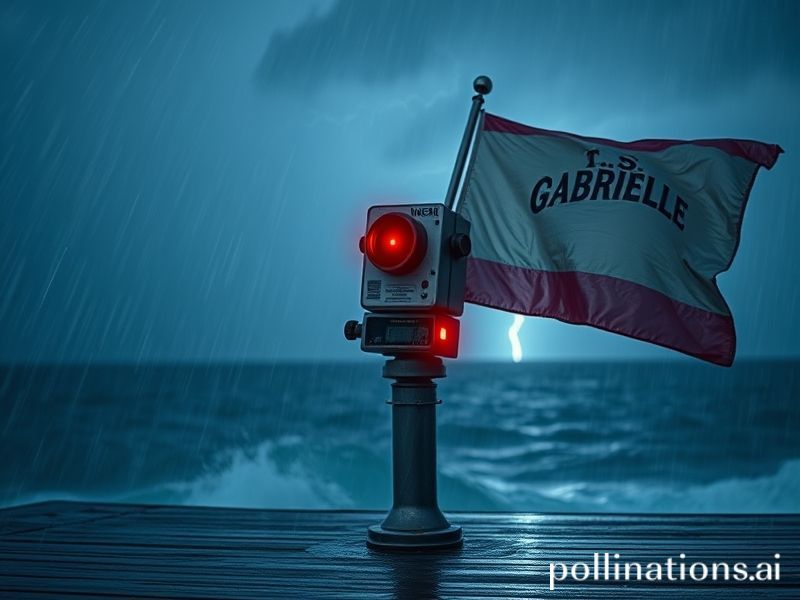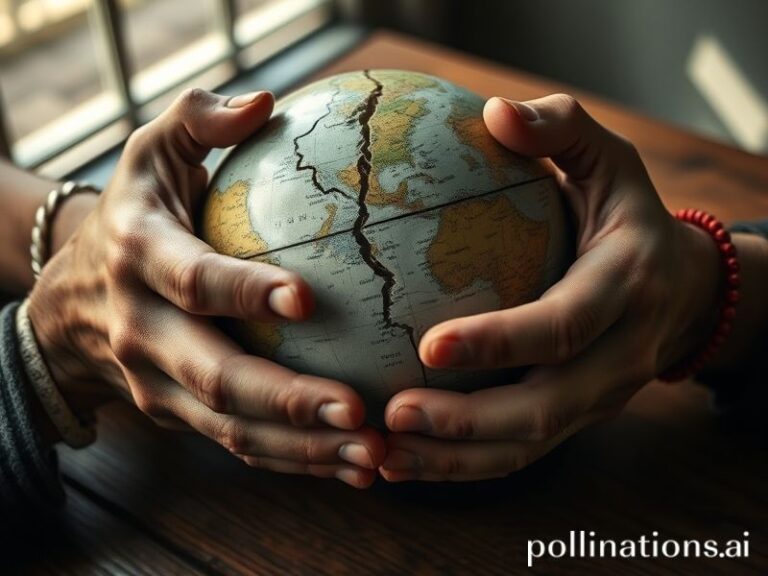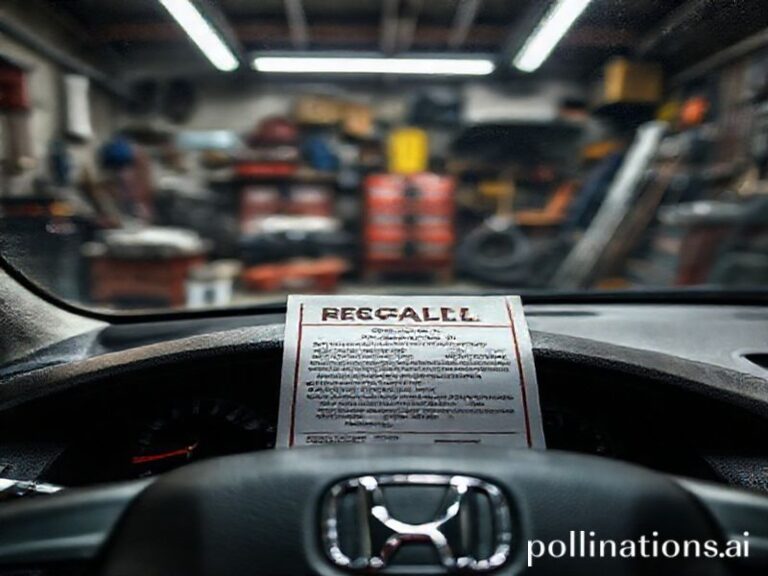Tropical Storm Gabrielle 2025: How One Polite Tempest Unraveled the World’s Supply Chains, Port Futures, and Fragile Egos
Tropical Storm Gabrielle 2025: A Gentle Reminder That the Planet Has Had Enough
By Dave’s Locker Foreign Desk
Somewhere between the 38th Zoom call on “global resilience” and the 39th, Gabrielle wandered into the mid-Atlantic—an uninvited guest with 65-mph winds and the social graces of a drunken tourist who refuses to leave the Airbnb. The storm itself was modest by cyclone standards: no Category-5 fireworks, no made-for-Netflix devastation reel. Instead, Gabrielle delivered the more lethal weapon of 2025: a thousand paper cuts to supply chains that were already hemorrhaging cash and credibility.
Meteorologically, Gabrielle began as a moist sneeze off the Cape Verde Islands. Politically, it matured into a case study in planetary fatigue. The European Centre for Medium-Range Weather Forecasts—staffed, as ever, by brilliant people who still can’t convince their own energy ministers to read a bar chart—issued its first bulletin while simultaneously updating its website’s cookie policy. Priorities.
By the time Gabrielle pirouetted past the Azores, she had forced the rerouting of 312 trans-Atlantic flights, thus stranding 47,000 passengers whose greatest hardship was discovering that business-class lounge hummus now costs extra. Ryanair, sensing an opportunity, introduced a “Turbulence Convenience Fee” and saw its share price jump 4%. Somewhere in Dublin, Michael O’Leary smiled, which is never a good omen.
Meanwhile, the storm’s tail flicked across Portugal’s Alentejo wine region just as the Touriga Nacional grapes reached peak ripeness. The resulting €200 million loss in premium port futures was instantly rebranded by a London hedge fund as “climate-alpha volatility,” bundled into a derivative, and sold to Norwegian pensioners who still believe ESG stands for “Extra Silky Guarantees.” If you listen carefully, you can hear the fjords sigh.
Gabrielle’s real mischief, however, lay in the North Atlantic Current, that giant conveyor belt politely ferrying tropical heat toward Europe like an overworked intern. The storm’s cool freshwater infusion nudged the current southward by a couple of degrees latitude—barely a rounding error unless you happen to farm barley in Denmark or sell gas in Qatar. Overnight, Rotterdam’s spot price for liquefied natural gas ticked up 7%, and Vladimir Putin’s ghostwriter began drafting a think-piece titled “Why Storms Respect National Sovereignty.”
Across the pond, Washington responded with characteristic coordination. The Federal Emergency Management Agency held a press conference to announce it was “monitoring the situation with our international partners,” which translates loosely to retweeting the Portuguese weather service between committee hearings on TikTok bans. Congress, eager to appear proactive, tabled the “Gabrielle Relief & Semiconductor Independence Act,” a 2,400-page document that allocates $18 billion to build microchip plants on stilts.
Down in the Global South, Gabrielle’s ripple effects were less theatrical but more personal. Senegal’s artisanal fishermen, already muscled out by Chinese trawlers the size of shopping malls, found their catch further depleted by shifting plankton blooms dragged northward by the storm’s wake. In downtown Dakar, a fish-market vendor shrugged and told me, “Even the hurricanes are outsourcing now.” I bought a cup of attaya from her and tried not to think about irony’s carbon footprint.
Back at the United Nations, Secretary-General António Guterres opened an emergency session on “multilateral meteorological solidarity,” only to discover that half the delegates were stuck in airport lounges watching the same looping CNN chyron: “STAY CALM AND CARRY ON BOARDING.” The session ended with a non-binding resolution urging member states to “acknowledge the sky’s mood swings.” Russia abstained, citing “atmospheric neutrality.”
And so we arrive at the broader significance of Tropical Storm Gabrielle, 2025 edition: not the body count (mercifully low) nor the property damage (insured), but the exquisite choreography of global dysfunction it exposed. One modest tempest revealed supply chains held together by duct tape and denial, financial markets that treat catastrophe like karaoke night, and political systems that can’t decide whether the sky is falling or merely pivoting to video.
In short, Gabrielle was the planetary equivalent of a polite cough at a funeral—soft, but enough to remind everyone that the deceased was also the one paying the bar tab. The storm has dissipated, its name retired for at least six years or until the WMO runs out of gender-neutral baby names, whichever comes first. The rest of us remain, clutching our reusable straws and boarding passes, scanning the horizon for the next unremarkable harbinger of the end times.
Bon voyage.







